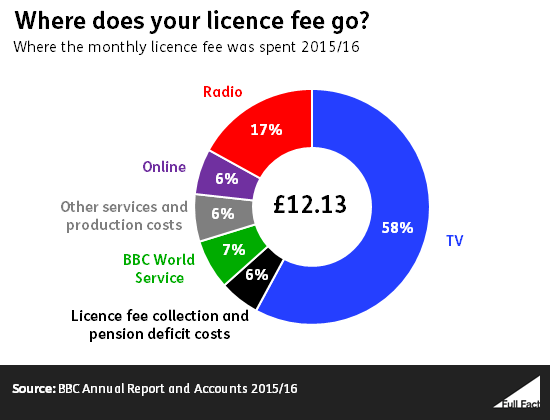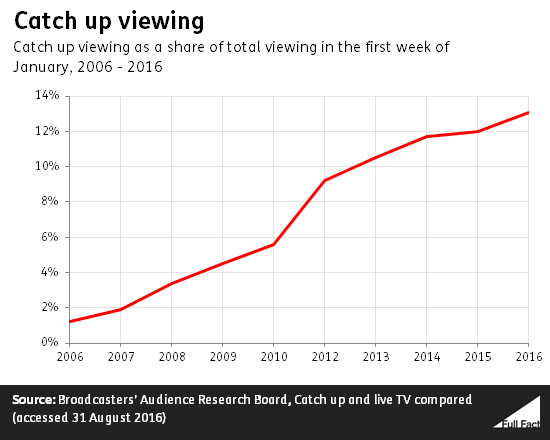“The BBC was apparently losing £150m a year through the so-called ‘iPlayer loophole’, the closure of which the government has been pushing through.”
Independent, 1 August 2016
“New laws come into force on September 1 which are designed to close the so-called “iPlayer loophole” costs the Beeb a rumoured £150million a year.”
Sun, 1 August 2016
The BBC has said it expects to lose £150 million from the so-called ‘iPlayer loophole’, though this is the figure for 2016/17 specifically, rather than a yearly one.
In July 2015 the BBC announced that it expected to make £150 million less from the licence fee in 2016/17 than it had originally expected in 2011. This was said to be because viewers are increasingly switching to iPlayer and mobile devices to view programmes and fewer households own televisions.
The BBC told us it doesn’t publish these forecasts and couldn’t provide any further information about the figure, so nobody can check how plausible its claims are. We will be making a freedom of information request for details of its projections.
Honesty in public debate matters
You can help us take action – and get our regular free email
The licence fee
At the moment the licence fee is £145.50 a year, or £12.13 a month. If the licence is only for black and white television then it is £49.
It has been set at the same level since 2010 and will stay the same until March next year. The money funds the BBC, World Service, BBC Monitoring, S4C the Welsh language channel and local television services which the BBC will support.
Earlier this year the former Secretary of State for Culture, Media and Sport said that from 2017 the licence fee will increase again in line with inflation until 2021/22.
The price of the licence fee is set by the government and agreed to by parliament, though the House of Commons Library points out that this normally passes without debate.
From 1 September the licence fee will also cover using catch-up services, such as BBC iPlayer, Sky or Virgin Media, which are used to watch BBC programmes.
The licence fee will also cover catch up and on demand services used on mobile devices outside of the home, so long as the viewer doesn’t plug the device in. If you plug your device in, that address must also have its own licence.
Anyone without a licence using these services could be prosecuted and face fines of up to £1,000 plus costs. In 2015 over 166,000 people were issued a fine for not paying their television licence, although the average cost of the fine was £173.
TV licences won’t be needed if you just use catch-up services from other channels such as ITV, Channel 4 or Sky Go. Over 75s also don’t have to pay the licence fee.
According to TV Licensing the changes to the licence rules will affect fewer than 2% of households—about 540,000 households. It says that the majority of people who use catch-up and on demand services already watch television and have a licence. We've asked TV Licensing for more details of its figures.
Businesses using live television and catch-up or on demand services are also required to pay the licence fee. We don’t know how many businesses are expected to be affected.
How much money does the BBC get?
The BBC receives around £3.7 billion from the licence fee each year, on top of that they make around £1.1 billion in commercial income from services such as BBC Worldwide.
So in 2016 just under £4.8 billion was spent on the BBC’s operating costs, producing content and running the organisation. The majority of this goes towards producing content for television.

Between 2011 and 2016 the BBC aimed to make a £700 million reduction in spending every year, a target which they have said they are on track to meet this year.
How we watch television
The Broadcasters’ Audience Research Board found that 33% of all TV viewing in 2015 was accounted for by the BBC. 72% of people tune into BBC One each week, making it the most watched channel in the UK.
Around 51% of UK adults use BBC Online each week, which is slightly less than last year.
Catch up viewing has increased considerably in the last ten years.
Around 13% of all television viewing is either watched on catch-up or recorded, according to a research for the Broadcasters Audience Research Board. It also found that the BBC accounted for almost 33% of all television viewing in 2015.

Correction 5 September 2016
We corrected this article to say that we can’t check how much the licence fee loophole cost the BBC. Although we were originally factchecking the claims made in the media about the BBC, in this case it was inappropriate not to challenge the fact that the BBC had not published its figures for public scrutiny. We will be making a freedom of information request for the details of its projections.
We also added in more detail about TV Licensing's figures, and a paragraph about requirements for businesses.
Image courtesy of Iain Masterton/Alamy stock photo

